SWEDISH
SOUTH ASIAN STUDIES NETWORK
Newsletter 100:
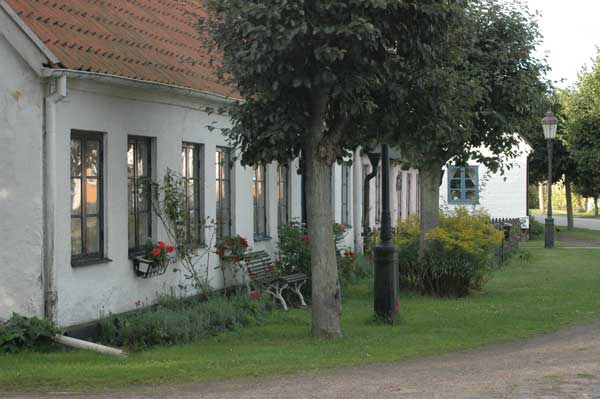 4 September 2009
4 September 2009
| Educational News |
| Lectures and seminars |
| Business and Politics |
| South Asia related Culture |
| New and updated information |
• Successful SASNET conference for young Nordic scholars
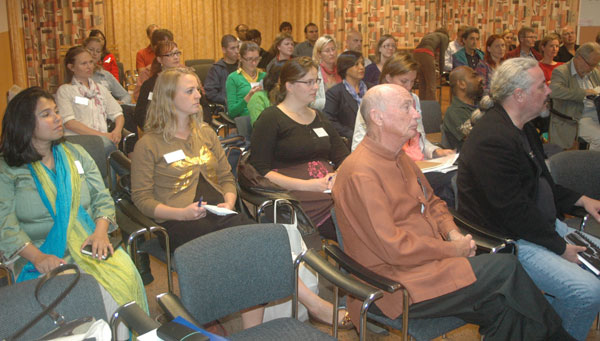 SASNET organised a Nordic conference on South Asian Studies for young scholars at Falsterbo Kursgård in Höllviken (south of Malmö) 17-19 August 2009. The aim of the conference was to gather masters students, PhD candidates, and young post-docs in Sweden, Denmark, Finland, and Norway who focus on South Asia in their research studies. 45 participants came to the conference, that had been planned by an organising committee led by Dr. Kristina Myrvold, Dept. of History of Religions, Lund University, and Ms. Julia Velkova, MA in Eastern Philosophy and Culture from the University of Sofia, Bulgaria.
SASNET organised a Nordic conference on South Asian Studies for young scholars at Falsterbo Kursgård in Höllviken (south of Malmö) 17-19 August 2009. The aim of the conference was to gather masters students, PhD candidates, and young post-docs in Sweden, Denmark, Finland, and Norway who focus on South Asia in their research studies. 45 participants came to the conference, that had been planned by an organising committee led by Dr. Kristina Myrvold, Dept. of History of Religions, Lund University, and Ms. Julia Velkova, MA in Eastern Philosophy and Culture from the University of Sofia, Bulgaria.
The aim behind the conference, which was very much similar to another successful conference that SASNET organised in Marstrand in October 2002 (more information about the 2002 conference), was to provide an opportunity for young scholars to present their future and ongoing research projects, estblish contacts with colleagues in the Nordic countries, and discuss common challenges and opportunities when conducting research in South Asia related studies.
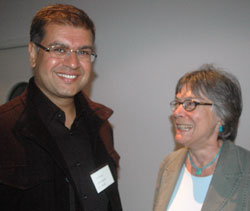 |
| Vinayak Chaturvedi and Pamela Price. |
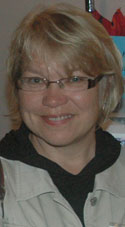 |
 |
| Mirja Juntunen | Teddy Primack |
Prof. Vinayak Chaturvedi, University of California Irvine, had been invited to be the keynote speaker. He lectured about ”Dialogues with M.K. Gandhi on History and Violence in India”.
Prof. Pamela Price, Oslo University, was another principal speaker. She talked about ”Being a South Asianist in the Nordic countries: Being Glocal”.
Dr. Mirja Juntunen, Uppsala University, coordinator of the Nordic Center in India (NCI), talked about ”A Nordic Perspective on Prospects and Challenges for Scholarly Interaction with South Asia”; and Mr. Teddy Primack, Editor, Academic Documents Associates, New York, made an exciting and useful presentation entitled ”How to displease an editor” about how to deliver manuscripts for scientific publishing.
A number of thematic sessions were led by Prof. Knut A. Jacobsen, University of Bergen (History, Religion, and Culture I); Dr. Peter B Andersen, Copenhagen University (History, Religion, and Culture II); Dr. Catarina Kinnvall, Lund University (Society, Development, and Gender); Dr. Per Hilding, Stockholm University (Nature, Health, and Environment); and Dr. Per Knutsson, Gothenburg University (Technology, Economics, and International Relations).
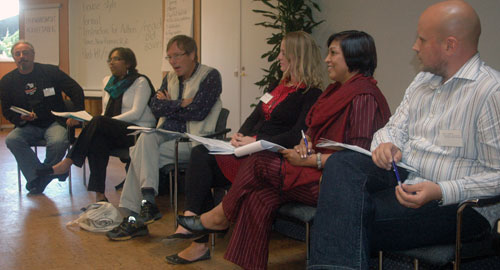 Finally three plenary interdisciplinary sessions were organised on important issues. They were prepared by selected student participants, who raised questions on three given topics, namely ”Career Planning, Funding, and Passion for South
Asian Studies”, ”Publication, Conference,Teaching and Other Activities”; and ”Networking and Future Research”, to a number of ”champions”, senior Nordic researchers from the SASNET network. (photo from one of the sessions).
Finally three plenary interdisciplinary sessions were organised on important issues. They were prepared by selected student participants, who raised questions on three given topics, namely ”Career Planning, Funding, and Passion for South
Asian Studies”, ”Publication, Conference,Teaching and Other Activities”; and ”Networking and Future Research”, to a number of ”champions”, senior Nordic researchers from the SASNET network. (photo from one of the sessions).
The ”champions” were Prof. Bo Lindblad, Karolinska Institutet; Dr. Anna Godhe, Gothenburg University; Dr. Jan Magnusson, Lund University; Dr. Christer Norström, Stockholm University, Prof. Devdatt Dubhashi, Chalmers University of Technology; Dr. Zarina Kabir, Karolinska Institutet; Dr. Stig Toft Madsen, SASNET; and Prof. Staffan Lindberg, Lund University. Go for the conference web page.
See the programme, including a list of participants (as a pdf-file).
More photos from the conference.
• Prominent speakers at Gandhi seminar in Lund on September 10th
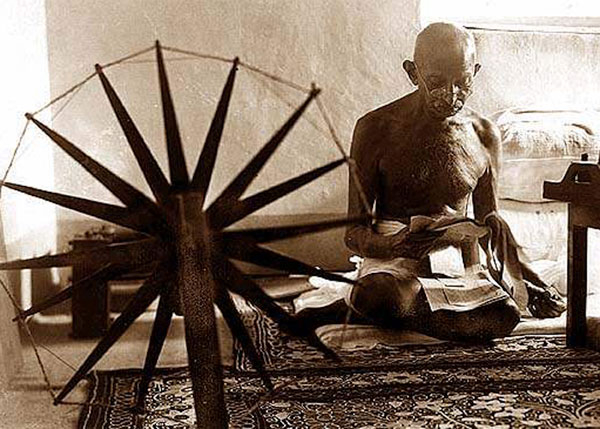 David Arnold, Professor of Asian and Global History at the University of Warwick, UK, and the Indian Ambassador to Sweden, Mr. Balkrishna Shetty, participate in a SASNET seminar on Mahatma Gandhi, to be held in Lund on Thursday 10 September 2009, 19.00–21.00.
David Arnold, Professor of Asian and Global History at the University of Warwick, UK, and the Indian Ambassador to Sweden, Mr. Balkrishna Shetty, participate in a SASNET seminar on Mahatma Gandhi, to be held in Lund on Thursday 10 September 2009, 19.00–21.00.
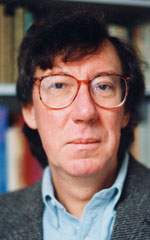 David Arnold, who is also a Fellow of the British Academy, will talk about ”Gandhi: The Mahatma and the Machine”. Arnold was formerly Professor of South Asian History at the School of Oriental and African Studies (SOAS) in London and was a founding member of the Subaltern Studies group of South Asia scholars whose work helped to transform the writing of Indian history in the 1980s and 1990s.
David Arnold, who is also a Fellow of the British Academy, will talk about ”Gandhi: The Mahatma and the Machine”. Arnold was formerly Professor of South Asian History at the School of Oriental and African Studies (SOAS) in London and was a founding member of the Subaltern Studies group of South Asia scholars whose work helped to transform the writing of Indian history in the 1980s and 1990s.
David Arnold taught an undergraduate course on Gandhi and Gandhism at SOAS for many years and in 2001 published a work on Gandhi in the ‘Profiles in Power’ series. His current research is on everyday technology in India from 1880 to 1960. This includes a reappraisal of Gandhi’s significance as a critic of modernity and his impact on technological change in twentieth-century India. This is part of the background to his Lund University presentation.
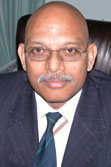 H.E. Mr. Balkrishna Shetty, Ambassador of India to Sweden, will talk on ”The Relevance of Mahatma Gandhi in today’s World”. Mr. did his B.Sc Honours in Mathematics from Presidency
College, Calcutta (1970) and M.Sc. (Mathematics) from Indian Institute of
Technology, Kanpur (1972). After a period of research in Mathematics at the Tata
Institute of Fundamental Research, Mumbai, he joined Indian Statistical Service in
1973 and was Assistant Director, dealing with Industries and Trade Statistics in
Central Statistical Organisation, Government of India, New Delhi. He has been
India’s Ambassador to Sweden since January 2009.
H.E. Mr. Balkrishna Shetty, Ambassador of India to Sweden, will talk on ”The Relevance of Mahatma Gandhi in today’s World”. Mr. did his B.Sc Honours in Mathematics from Presidency
College, Calcutta (1970) and M.Sc. (Mathematics) from Indian Institute of
Technology, Kanpur (1972). After a period of research in Mathematics at the Tata
Institute of Fundamental Research, Mumbai, he joined Indian Statistical Service in
1973 and was Assistant Director, dealing with Industries and Trade Statistics in
Central Statistical Organisation, Government of India, New Delhi. He has been
India’s Ambassador to Sweden since January 2009.
The discussions will be moderated by SASNET’s Director, Dr. Anna Lindberg. Venue: Main auditorium of Lund University’s Centre for Languages and Literature (SOL-Centrum), Helgonabacken 14, Lund. All are welcome. More information (as a pdf-file).
• Inauguration of the 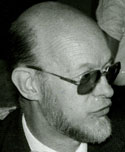 Mahatma Gandhi Book Collection and SASNET’s Gandhi web site
Mahatma Gandhi Book Collection and SASNET’s Gandhi web site
Earlier the same day, on Thursday 10 September 2009, at 15.00, the Mahatma Gandhi Book Collection (part of the Karl Reinhold Haellquist Memorial Collection) and SASNET’s web site on the collection (www.sasnet.lu.se/gandhi) will be formally inaugurated by the Ambassador of India to Sweden, Mr. Balkrishna Shetty, at Lund University’s Asia Library at Scheelevägen 15 C. The extensive book collection was donated to Lund University in 2004 and has since been catalogued by SASNET. Ms. Inger Sondén Haellquist, Karl Reinhold Haellquist’s widow, will be the guest of honour during the function. More information about the Karl Reinhold Haellquist Memorial Collection.
Directly afer the inauguration, at 15.45, the Ambassador will introduce a 45 minutes film on the life of Mahatma Gandhi, entitled ”Mahatma – A Great Soul of the 20th Century”. The film has been jointly produced by the Public Diplomacy Division, Ministry of External Affairs, Government of India; and the Gandhi Films Foundation. Venue: Javasalen, Scheelevägen 15 C (next to the Asia Library)
• Ruby Sain lectures about Depression – a social problem of the elderly
population in India
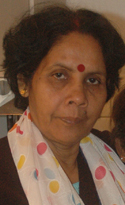 Dr. Ruby Sain from the Dept. of Sociology, Jadavpur University, Kolkata, India, will hold an open lecture at Lund University on Wednesday 16 September 2009, 14.15 – 17.00. The seminar is jointly organised by the School of Social Work at Lund university,
Vårdalinstitutet and SASNET. Dr. Sain, who mostly works on health, illness, ageing, religion and research methodology issues, will talk about “Depression – a social problem of the elderly
population in India”. She is the founding editor of the Jadavpur University Journal of Sociology, and her forthcoming books are titled ”Contemporary Social Problems in India-Vol I” (ed.) and ”Folk Religion in Bengal”. Besides, Dr Sain is secretary of the International Forum for the Study of Society and Religion (IFFSR), a forum that links researchers and scholars from Jadavpur University, University of Gothenburg and the Oxford Center for Hindu Studies. She has come to Sweden on a SASNET guest lecture programme grant, invited by the Department of Literature, History of Ideas, and Religion, Gothenburg University. Venue for the Lund seminar: Edebalksalen, School of Social Work, Bredgatan 26, Lund. More information.
Dr. Ruby Sain from the Dept. of Sociology, Jadavpur University, Kolkata, India, will hold an open lecture at Lund University on Wednesday 16 September 2009, 14.15 – 17.00. The seminar is jointly organised by the School of Social Work at Lund university,
Vårdalinstitutet and SASNET. Dr. Sain, who mostly works on health, illness, ageing, religion and research methodology issues, will talk about “Depression – a social problem of the elderly
population in India”. She is the founding editor of the Jadavpur University Journal of Sociology, and her forthcoming books are titled ”Contemporary Social Problems in India-Vol I” (ed.) and ”Folk Religion in Bengal”. Besides, Dr Sain is secretary of the International Forum for the Study of Society and Religion (IFFSR), a forum that links researchers and scholars from Jadavpur University, University of Gothenburg and the Oxford Center for Hindu Studies. She has come to Sweden on a SASNET guest lecture programme grant, invited by the Department of Literature, History of Ideas, and Religion, Gothenburg University. Venue for the Lund seminar: Edebalksalen, School of Social Work, Bredgatan 26, Lund. More information.
• SASNET/UPF seminar on Contemporary Pakistan: Islamism, Human Rights and Terrorism
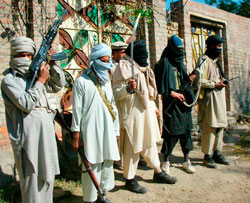 A joint SASNET/UPF (Association of Foreign Affairs at Lund University) seminar on ”Contemporary Pakistan: Islamism, Human Rights and Terrorism” will be held in Lund on Wednesday 16 September 2009, 19.30–21.00. The speakers are Prof. Ishtiaq Ahmed, working as Visiting Research Professor at the Institute of South Asian Studies (ISAS), National University of Singapore; and Dr. Rubya Mehdi, University of Copenhagen.
A joint SASNET/UPF (Association of Foreign Affairs at Lund University) seminar on ”Contemporary Pakistan: Islamism, Human Rights and Terrorism” will be held in Lund on Wednesday 16 September 2009, 19.30–21.00. The speakers are Prof. Ishtiaq Ahmed, working as Visiting Research Professor at the Institute of South Asian Studies (ISAS), National University of Singapore; and Dr. Rubya Mehdi, University of Copenhagen.
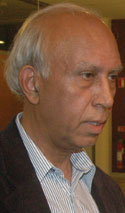 Ishtiaq Ahmed (photo to the left) is currently on leave from the Dept. of Political Science, Stockholm University. At ISAS, he is working on a research project ebtitled ”Is Pakistan a Garrison State?” The aim of the study is to generate a comprehensive analysis of the reasons why the military came to play the dominant role in Pakistani politics. He is also in the process of completing a major study based on first-hand accounts of the partition of the Punjab in 1947. Ishtiaq has taught and carried out research on issues of human rights, women's rights and minorities extensively in South Asian contexts in general and in Pakistan in particular. He has also written extensively on the politics of South Asia, especially Pakistan. He wrote a weekly column in the Pakistan English-language newspapers, The Daily Times and The News International during May 2002 and June 2007. Besides, he is on the editorial advisory board of Asian Ethnicity, Journal of Punjab Studies, IPRI Journal and PIPS Journal of Conflict and Peace Studies.
Ishtiaq Ahmed (photo to the left) is currently on leave from the Dept. of Political Science, Stockholm University. At ISAS, he is working on a research project ebtitled ”Is Pakistan a Garrison State?” The aim of the study is to generate a comprehensive analysis of the reasons why the military came to play the dominant role in Pakistani politics. He is also in the process of completing a major study based on first-hand accounts of the partition of the Punjab in 1947. Ishtiaq has taught and carried out research on issues of human rights, women's rights and minorities extensively in South Asian contexts in general and in Pakistan in particular. He has also written extensively on the politics of South Asia, especially Pakistan. He wrote a weekly column in the Pakistan English-language newspapers, The Daily Times and The News International during May 2002 and June 2007. Besides, he is on the editorial advisory board of Asian Ethnicity, Journal of Punjab Studies, IPRI Journal and PIPS Journal of Conflict and Peace Studies.
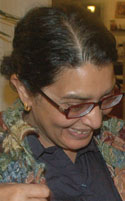 Rubya Mehdi (photo to the right) has a PhD in Law, and is a senior researcher at the Carsten Niebuhr Institute, Dept. of Cross-Cultural and Regional Studies, University of Copenhagen. She is one of Denmark’s leading experts in Islamic law, and has conducted research in Denmark for 20 years. She is also a visiting professor with the Higher Education Commission of Pakistan, and she was involved in the Protection of women Act 2006, which was passed to improve the situation of women in Pakistan. It also tried to make some changes in the Hudood ordinance which was very much discriminating against women in rape cases.
Rubya Mehdi (photo to the right) has a PhD in Law, and is a senior researcher at the Carsten Niebuhr Institute, Dept. of Cross-Cultural and Regional Studies, University of Copenhagen. She is one of Denmark’s leading experts in Islamic law, and has conducted research in Denmark for 20 years. She is also a visiting professor with the Higher Education Commission of Pakistan, and she was involved in the Protection of women Act 2006, which was passed to improve the situation of women in Pakistan. It also tried to make some changes in the Hudood ordinance which was very much discriminating against women in rape cases.
Dr. Stig Toft Madsen, SASNET, will be the moderator for the discussion. Venue: Café Athen, Akademiska Föreningen (AF), Sandgatan 2, Lund.
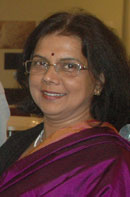 |
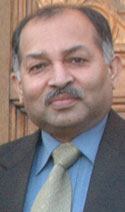 |
| Anjoo Upadhyaya and Vijaykant Lal Karna. | |
• SASNET/UPF Seminar on the Political Situation in Nepal
A joint SASNET/UPF (Association of Foreign Affairs at Lund University) seminar on ”Political Transitions and the Peace Process in Nepal” will be held in Lund on Wednesday 23 September 2009, 19.30–21.00. Anjoo Sharan Upadhyaya, Professor of Political Science and Director, Centre for the Study of Nepal at Banaras Hindu University (BHU) in Varanasi, India, will participate in the seminar along with Mr. Vijaykant Lal Karna, Nepalese ambassador to Scandinavia (based in Denmark) who is also a political scientist by profession, having worked at Tribhuvan University for 20 years.
In her 35 years of teaching career at Banaras Hindu University, Prof. Upadhyaya has been the Dean, Faculty of Social Sciences; and served twice as the Head, Department of Political Science and also as the Director of Center for Rural Development. Outside of India, she has worked for example as Research Director at UNU/Ulster University INCORE (Institute of Conflict Resolution and Ethnicity), UK; as Fellow at London School of Economics & Politics (LSE), and as Scholar-in Residence at the Woodrow Wilson Centre for International Scholars, Washington DC, USA. Professor Upadhyaya has published extensively both nationally and internationally on themes related to issues of self-determination, ethnicity, conflict, federalism, gender, development and peace. She has undertaken post-doctoral studies at LSE, Department of Peace and Conflict Research, Uppsala University, Sweden, and Brown University, USA. Currently she is engaged in a collaboration project with Karlstad University.
Dr. Leif Bjellin from the the Dept. of Cell and Organism Biology, Lund University, will be the moderator for the seminar. Venue: Café Athen, Akademiska Föreningen (AF), Sandgatan 2, Lund.
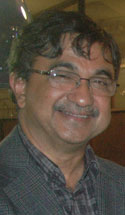 • Priyankar Upadhyaya lectures on Religious Peace Building in India
• Priyankar Upadhyaya lectures on Religious Peace Building in India
Professor Priyankar Upadhyaya from Benares Hindu University (BHU), Varanasi, India, will hold a lecture at Lund University on ”Religious Peace Building in India” on Thursday 24 September, 10.15–12.00. The seminar is jointly organised by the Dept.of History of Religions, Lund University, and SASNET. Prof. Upadhyaya is Director at the Malaviya Centre for Peace Research at BHU. He holds a PhD of Jawaharlal Nehru University, and Advance International Diploma(s) in Conflict Resolution from Uppsala University, Sweden.
In Sweden, he has also served as a Visiting Professor at Karlstad University. During September 2009 he is based at the International Peace Research Institute (PRIO) in Oslo. Venue: Room 438, Centre for Theology and Religious Studies (CTR), Allhelgona Kyrkogata 8, Lund.
• SASNET meetings with South Asian Ambassadors
On 3–4 August 2009, SASNET’s director Anna Lindberg and deputy director Lars Eklund went to Stockholm to meet the Ambassadors of India, Pakistan and Bangladesh, as part of ongoing discussions about the future of SASNET and possibilities of cooperation between South Asian institutions.
At the Embassy of India they were received by the Ambassador Mr. Balkrishna Shetty, and the First Secretary Mrs. Madhumita Bhagat; at the Embassy of Pakistan they were received by the new Ambassador Mr. Nadeem Riyaz; and at the Embassy of Bangladesh they were received by outgoing Ambassador Mr. Muhammad Azizul Haque. Fruitful discussions were held at all the three embassies.
On Monday 31 August 2009, Anna Lindberg and Lars Eklund went to Hellerup north of Copenhagen, to meet the Ambassador of Nepal to Scandinavia, Mr, Vijaykant Lal Karna.
Visits are also planned to soon meet both the Ambassador of Sri Lanka to Sweden in Stockholm, and the Ambassador of Afghanistan to Scandinavia in Oslo.
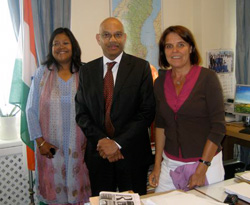 |
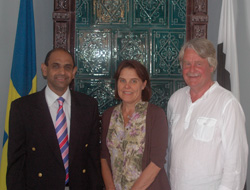 |
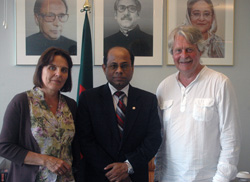 |
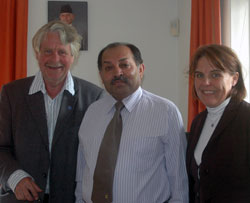 |
| Embassy of India: Madhumita Ghosh, Balkrishna Shetty and Anna Lindberg. | Embassy of Pakistan: Nadeem Riyaz, Anna Lindberg and Lars Eklund. | Embassy of Bangladesh: Anna Lindberg, Muhammad Azizul Haque and Lars Eklund. | Embassy of Nepal: Lars Eklund, Vijaykant Lal Karna and Anna Lindberg. |
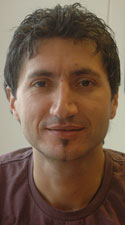 • Internship for Nihat Ulusoy at SASNET’s office
• Internship for Nihat Ulusoy at SASNET’s office
Since September 1, 2009, Mr. Nihat Ulusoy works on an internship for SASNET. Mr. Ulusoy is a last year Bachelors student at the University of Malmö where he studies International Relations and Ethnic Relations at the IMER programme. He was born in Turkey but lived in USA from 1995 till 2006 when he moved to Sweden. During his four months internship at SASNET he assists Anna Lindberg and Lars Eklund with various tasks such as organising seminars.
| Prof. Tiwari, one of the workshop convenors, demonstrates a tool to pump cool air from beneath the earth, a simple form of air conditioner. |
• SASNET funded workshop on Solar Power in New Delhi
A Training and Awareness Program cum Workshop
on
”Implementation strategies for the transfer of hybrid photovoltaic-thermal technology (H-PV/T) from research laboratory to field” was held in New Delhi, India, 25–28 August 2009. The successful conference was jointly organised by the Indian Institute of Technology (IIT) Delhi, the Bag Energy Research Society (BERS) in India, and Växjö University, Sweden, and funded by a SASNET interdisciplinary workshop grant in 2007 (more information). The convenors were Prof. G N Tiwari, BERS and IIT Delhi, and Dr. Krister
Håkansson, University of Växjö. The main objective was to create a platform at IIT Delhi for interaction amongst scientists, academicians, manufacturers, potential users/farmers, maintenance engineers, executives of NGO, social workers that are working in area of renewable energy particularly in the area of Photovoltaic (PV) systems, Photovoltaic Thermal (PV-T) and Solar Thermal systems. The participants came from all over India, and included farmers from rural areas, maintenance engineers, social scientist/workers, technical experts and representatives of different NGO:s. Read the conference report (as a pdf-file).
Krister Håkansson has also kindly contributed with an article on the workshop in Swedish, specially written for SASNET. Read the article entitled ”Nygammal teknik för långsiktig överlevnad”.
• More information about SASNET and its
activities
See SASNET’s page, http://www.sasnet.lu.se/sasnet.html
• Six India/South Asia ECEMW programmes running for 2009–10
As reported in the previous SASNET newsletter, six India and South Asia related Erasmus Mundus External Cooperation Window programmes were selected in mid-June 2009 for mobility activities between Europe and India/South Asia starting in the academic year 2009–2010. They are run by consortia of European and Indian/South Asian universities. Two of the selected programmes belong to Lot 11, a geographical window dedicated to South Asia (Afghanistan, Bhutan, Nepal, Pakistan and Bangladesh, but also including India).
– Lot 11/programme No. 1 is coordinated by Aalborg University, Denmark. The consortium was formed by 8 universities in Europe, and 11 universitites
in Asia (Afghanistan 1, Bangladesh 3, Bhutan 1, India 2, Indonesia 1, Nepal 1, Pakistan 1, Thailand 1). More information about the programme
 – Lot 11/programme No. 2 is coordinated by Vrije Universiteit Brussel, Belgium. The consortium was formed by 11 universities in Europe, and 9 universitites in Asia (Afghanistan 1, Bangladesh 2, Bhutan 1, India 1, Indonesia 1, Nepal 1, Pakistan 2). More information about the programme. The consortium web page has now been opened. Applications will be accepted from 1 November 2009. Go for the web page.
– Lot 11/programme No. 2 is coordinated by Vrije Universiteit Brussel, Belgium. The consortium was formed by 11 universities in Europe, and 9 universitites in Asia (Afghanistan 1, Bangladesh 2, Bhutan 1, India 1, Indonesia 1, Nepal 1, Pakistan 2). More information about the programme. The consortium web page has now been opened. Applications will be accepted from 1 November 2009. Go for the web page.
Four programmes belong to Lot 13, entirely dedicated to collaboration between India and Europe. Each selected programme has a budget of roughly around EUR 5 million per year to spend on mobility for students, teachers, researchers, and academic staff in both directions. Two of the programmes are coordinated by Swedish universities.
– Lot 13/programme 1 is coordinated by Politecnico di Torino, Italy. The consortium consists 9 universities in Europe, and 8 universities in India (Amrita University, Coimbatore; Anna University, Chennai; Indian Institute of Technology (IIT) Delhi; Indian Statistical Institute, Kolkata; Jadavpur University, Kolkata; Kakatiya University, Warangal; University of Pune; and Centre of Environmental Planning and Technology, Ahmedabad. More information about the programme.
 – Lot 13/programme 2 is coordinated by Lund University, Sweden. It is the continuation of the mobility programme that last year was called Lot 15. Other Nordic partner universities in the consortium are Karolinska Institutet, Stockholm; and Norwegian University of Science and Technology (NTNU), Trondheim.The Indian partner universities are University of Delhi; Jadavpur University, Kolkata; University of Pune; University of Kerala; Indian Institute of Technology (IIT) Kanpur; Tata Institute of Social Sciences (TISS), Mumbai; Pravara Institute of Medical Sciences, Loni, Maharashtra; and Anand Agricultural University, Gujarat. The partnership programme that was selected in 2008 is currently running at full speed from the Summer 2009. The mobility of approximately 340 individuals consisists of a flow by 75 % from India to Europe, and 25 % from Europe to India.
A new Call for Mobility applications has just been issued. This second round will award 183 scholarships for all mobility groups starting in 2010 (with start dates between April 1 and September 1, 2010). The
Call opened on 1 September 2009, and will close on 1 November. More information on the consortium web site.
– Lot 13/programme 2 is coordinated by Lund University, Sweden. It is the continuation of the mobility programme that last year was called Lot 15. Other Nordic partner universities in the consortium are Karolinska Institutet, Stockholm; and Norwegian University of Science and Technology (NTNU), Trondheim.The Indian partner universities are University of Delhi; Jadavpur University, Kolkata; University of Pune; University of Kerala; Indian Institute of Technology (IIT) Kanpur; Tata Institute of Social Sciences (TISS), Mumbai; Pravara Institute of Medical Sciences, Loni, Maharashtra; and Anand Agricultural University, Gujarat. The partnership programme that was selected in 2008 is currently running at full speed from the Summer 2009. The mobility of approximately 340 individuals consisists of a flow by 75 % from India to Europe, and 25 % from Europe to India.
A new Call for Mobility applications has just been issued. This second round will award 183 scholarships for all mobility groups starting in 2010 (with start dates between April 1 and September 1, 2010). The
Call opened on 1 September 2009, and will close on 1 November. More information on the consortium web site.
 – Lot 13/programme 3 is coordinated by the Royal Institute of Technology (KTH), Stockholm, Sweden. The consortium is entitled ”EURINDIA” and was formed by 10 universities in Europe, and 9 universities in India (Anna University, Chennai;
Anurag Narayan College, Gaya; Patna University; Indian Institute of Technology (IIT) Guwahati; Indian Institute of Technology (IIT) Roorkee;
National Law School of India University, Bangalore;
Tamil Nadu Agricultural University (TNAU);
University of Kalyani, West Bengal;
University of Pune), plus three associated institutions in India.
– Lot 13/programme 3 is coordinated by the Royal Institute of Technology (KTH), Stockholm, Sweden. The consortium is entitled ”EURINDIA” and was formed by 10 universities in Europe, and 9 universities in India (Anna University, Chennai;
Anurag Narayan College, Gaya; Patna University; Indian Institute of Technology (IIT) Guwahati; Indian Institute of Technology (IIT) Roorkee;
National Law School of India University, Bangalore;
Tamil Nadu Agricultural University (TNAU);
University of Kalyani, West Bengal;
University of Pune), plus three associated institutions in India.
The EURINDIA programme will hold its first Consortium Meeting at KTH in Stockholm 21–23 September 2009. More information will soon appear on the consortium web page: http://www.kth.se/om/internationellt/ecw?l
 – Lot 13/programme 4 is coordinated by Ecole Centrale Nantes, France. The consortium is entitled ”WILLPower, Window India Learning Link Power”, and was formed by 10 universities in Europe, and 7 universities in India (Indian Institute of Science (IISc), Bangalore;
Anna University, Chennai;
University of Delhi;
Indian Institute of Technology (IIT) Madras, Chennai; Indian Institute of Technology (IIT) Guwahati; Indian Institute of Technology (IIT) Kanpur; Indian Institute of Technology (IIT) Rajasthan). The Lot 13 Willpower web page has been opened. Go for the consortium web page.
– Lot 13/programme 4 is coordinated by Ecole Centrale Nantes, France. The consortium is entitled ”WILLPower, Window India Learning Link Power”, and was formed by 10 universities in Europe, and 7 universities in India (Indian Institute of Science (IISc), Bangalore;
Anna University, Chennai;
University of Delhi;
Indian Institute of Technology (IIT) Madras, Chennai; Indian Institute of Technology (IIT) Guwahati; Indian Institute of Technology (IIT) Kanpur; Indian Institute of Technology (IIT) Rajasthan). The Lot 13 Willpower web page has been opened. Go for the consortium web page.
 • Nordic Association for South Asian Studies meets after five years
• Nordic Association for South Asian Studies meets after five years
After a gap of five years, the Nordic Association for South Asian Studies, NASA, arranges a conference and a PhD workshop 26–29 May 2010 in Helsinki, Finland. The theme for the conference will be ”Globalizing South Asia”, and it is organised by the University of Helsinki. The conference aims to bring scholars from
different fields within humanities and social sciences (history, anthropology, sociology, economics,
geography, environmental science, development studies and political science)
together to analyze cultural, economic, political and environmental
connections in South Asia. Both Nordic
and non-Nordic scholars are invited to participate in the conference that is meant to stimulate
networking and exchange, and to create a forum for discussions for
scholars and doctoral students within and outside the Nordic countries. The
deadline for panel proposals is by 30 October 2009 and for abstracts of
papers by 31 January 2010 by e-mail to both the convenors, Dr. Sirpa Tenhunen, and Dr. Klaus Karttunen. The keynote speakers will be Professor Steve Derne, State University of New York at Geneseo, USA; Prof. Bishnupriya Ghosh, University of California, Santa Barbara, USA; Prof. William Mazzarella, University of Chicago, USA; and Prof. Himanshu Rai, Centre for Historical Studies, Jawaharlal Nehru University (JNU), India. A peer-reviewed volume of selected papers will be published after the
conference.
Full information about the 2010 NASA conference.
• Doctoral dissertation on Nutritional Status Among Older Persons in Rural Bangladesh
Tamanna
Ferdous, Division of Clinical Nutrition and Metabolism, Department of Public Health and Caring Sciences, Uppsala University, will defend her doctoral dissertation thesis entitled ”Determinants of Functional Impact of Nutritional Status Among Older Persons in Rural Bangladesh”
on Tuesday 22 September 2009, at 09.15. It deals with the fact that malnutrition is a major problem in Bangladesh. One third of the population in Bangladesh is malnourished, but figures for older persons specifically are scant. The thesis describes the nutritional status of individuals aged 60+ years, living in a rural community in Bangladesh, with particular focus on the impact of demographic, health and social factors on nutritional status. The faculty opponent will be Prof. Birgitta Sidenvall, Department of Nursing, School of Health Sciences, Jönköping University. Venue for the dissertation: The Auditorium, Museum Gustavianum, Akademigatan 3, Uppsala. More information.
• Doctoral dissertation on Vaccination against cholera and ETEC diarrhea
Tanvir Ahmed, Dept. of Microbiology and Immunology, Institute of Biomedicine
at Sahlgrenska Academy, Göteborg University, defended his doctoral dissertation titled ”Vaccination against cholera and ETEC diarrhea and interventions to improve vaccine immune responses” on 10 June 2009. Vibrio cholerae O1 and enterotoxigenic Escherichia coli (ETEC) together account for the majority of bacterial causes of acute dehydrating diarrhea in children in Bangladesh. Vaccines should be considered as an important public health tool for prevention of these diarrheal diseases. The results of Dr. Ahmed’s studies give important background information regarding the possibility of inducing effective immune responses to oral inactivated enteric vaccines in young children in developing countries. More information.
• Doctoral dissertation based on Bangladeshi studies
Matilda Nicklasson, Dept. of Microbiology and Immunology, Institute of Biomedicine
at Sahlgrenska Academy, Göteborg University, defended her doctoral dissertation titled ”Studies on the expression and regulation of enterotoxins and colonization factors in enterotoxigenic escherichia coli (ETEC)” on Thursday 31 January 2008. The results are based on studies of ETEC bacterias from patients at the International Centre for Diarrhoeal Disease Research (ICDDR,B) in Dhaka, Bangladesh. Enterotoxigenic Escherichia coli (ETEC) is one of the most common causes of acute watery diarrhoea in developing countries, particularly among local children less than five years and is also the most common cause of diarrhoea in travellers to ETEC enemic areas. The infection is transmitted by ingestion of contaminated food and water and the disease is established in the small intestine Colonization factors (CFs) on the bacterial surface mediate adhesion to the intestinal epithelium and diarrhoea is manifested by the actions of a heat-stable (ST) and / or a heat-labile (LT) enterotoxin. Two of the most common CFs in strains isolated world-wide are coli surface antigens 5 (CS5) and 6 (CS6). In this thesis the expression and regulation of these important virulence factors as well as the genetic variability among ETE strains have been studied. More information.
• Valuable South Asia information provided through H-ASIA network
 H-ASIA is a vibrating well-run discussion forum on Asian History and Studies, part of the Humanities & Social Sciences OnLine network (H-Net). The primary purpose of H-ASIA, that was launched already in 1994, is to enable historians and other Asia scholars to easily communicate current research and teaching interests; to discuss new articles, books, papers, approaches, methods and tools of analysis; to test new ideas and share comments and tips on teaching. H-Asia is especially committed to discussing region wide, comparative and professional issues important to scholars of Asia. H-Asia is administered by Frank F. Conlon, Professor Emeritus of History, South Asian Studies & Comparative Religion at University of Washington, USA.
H-ASIA is a vibrating well-run discussion forum on Asian History and Studies, part of the Humanities & Social Sciences OnLine network (H-Net). The primary purpose of H-ASIA, that was launched already in 1994, is to enable historians and other Asia scholars to easily communicate current research and teaching interests; to discuss new articles, books, papers, approaches, methods and tools of analysis; to test new ideas and share comments and tips on teaching. H-Asia is especially committed to discussing region wide, comparative and professional issues important to scholars of Asia. H-Asia is administered by Frank F. Conlon, Professor Emeritus of History, South Asian Studies & Comparative Religion at University of Washington, USA.
Full information about the H-Asia Discussion Network.
How to join H-Asia?
1. Send a post (with subject line empty) to listserv@h-net.msu.edu with the message. ”SUB H-ASIA Your first name Your surname, your institution (e.g. SUB H-ASIA Charles Bengtsson, Stockholm University). Note that the comma appears only between your surname and your institution.
2. This post will generate an automated acknowledgement containing arequest for subscriber information which must be completed and returned to the subscription editor. When this has been done the subscription editor will add your name to the H-ASIA list.
• World Water Week participants support Stockholm Statement
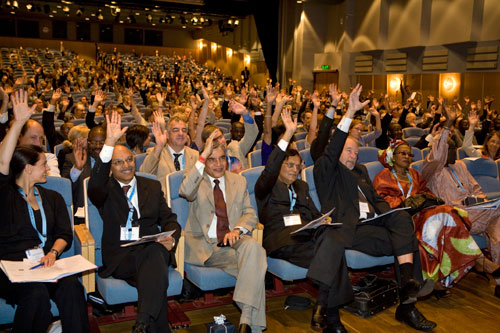 On Friday 21 August, the 2009 World World Water Week participants in Stockholm unanimously decided to support
a resolution entitled ”Stockholm Statement on Water, Climate Change, and Adaptation” (photo from the meeting). The statement
argues that water must be included in the COP-15 climate negotiations that will be held in Copenhagen in December 2009. At various sessions throughout the Week, a number of organizations and officials articulated the reasons why water needs to be an integral part of the negotiation process on climate change and adaptation. Those reasons became key points of the Stockholm Statement. Read the Stockholm Statement text.
On Friday 21 August, the 2009 World World Water Week participants in Stockholm unanimously decided to support
a resolution entitled ”Stockholm Statement on Water, Climate Change, and Adaptation” (photo from the meeting). The statement
argues that water must be included in the COP-15 climate negotiations that will be held in Copenhagen in December 2009. At various sessions throughout the Week, a number of organizations and officials articulated the reasons why water needs to be an integral part of the negotiation process on climate change and adaptation. Those reasons became key points of the Stockholm Statement. Read the Stockholm Statement text.
The 2009 World Water Week in Stockholm was held 16–22 August 2009. The theme for 2009 has been ”Water – Responding to Global Change: Accessing Water for the Common Good with Special Focus on Transboundary Waters”. The World Water Week, organised by the Stockholm International Water Institute (SIWI) is
the leading annual global meeting place for capacity-building,
partnership-building and follow-up on the implementation of international
processes and programmes in water and development, with large relevance
to South Asia. Every year, a large number of the particiants come from South Asia. It is filled with plenary sessions, seminars, workshops,
side events and special activities. The Scientific Programme Committee (SPC) planning for the conference is chaired by Prof. Jan Lundqvist, Dept. of Water and Environmental Studies, Linköping University.
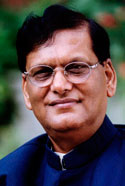 The 2009 Stockholm Water Prize awarded Dr. Bindeshwar Pathak, founder of the Sulabh Sanitation Movement in India. The award ceremony was held on Thursday 20 August 2009. Dr. Pathak also delivered the annual Stockholm Water Prize Laureate lecture at the Opening Plenary Session of the Week. As the founder of the Sulabh International Social Service Organisation, Dr. Pathak is known around the world for his wide ranging work in the sanitation field to improve public health, advance social progress, and improve human rights in India and other countries.
The 2009 Stockholm Water Prize awarded Dr. Bindeshwar Pathak, founder of the Sulabh Sanitation Movement in India. The award ceremony was held on Thursday 20 August 2009. Dr. Pathak also delivered the annual Stockholm Water Prize Laureate lecture at the Opening Plenary Session of the Week. As the founder of the Sulabh International Social Service Organisation, Dr. Pathak is known around the world for his wide ranging work in the sanitation field to improve public health, advance social progress, and improve human rights in India and other countries.
His accomplishments span the fields of sanitation technology, social enterprise, and healthcare education for millions of people in his native country, serving as a model for NGO agencies and public health initiatives around the world.
Since he established the Sulabh Sanitation Movement in 1970, Dr. Pathak has worked to change social attitudes toward traditional unsanitary latrine practices in slums, rural villages, and dense urban districts, and developed cost effective toilet systems that have improved daily life and health for millions of people. He has also waged an ongoing campaign to abolish the traditional practice of manual ”scavenging” of human waste from bucket latrines in India while championing the rights of former scavengers and their families to economic opportunity, decent standards of living, and social dignity. More information about Dr. Pathak and the award.
More information about the 2009 World Water Week.
• NIAS in Copenhagen introduces Nordic Post-doc Introductory Stipends
![]() The Nordic Institute of Asian Studies (NIAS) in Copenhagen now introduces what is called Nordic Post-doc Introductory Stipends. They are meant for researchers that have finished completed theur PhDs within the social sciences in an Asia related topic, and who are now looking for an opportunity to continue their research.
NIAS invites applications from young scholars who need time and freedom to concentrate on developing their post-doc project. With excellent library facilities, a modern publishing unit, and research staff dealing with different aspects of modern Asia, you can hardly find a more suitable or inspiring working place. The offer includes a three-month stay at NIAS on a salary that follows existing Danish university standards.
Three stipend positions are vacant from October 2009 to June 2010. The deadline for applications was 1 September 2009. More information.
The Nordic Institute of Asian Studies (NIAS) in Copenhagen now introduces what is called Nordic Post-doc Introductory Stipends. They are meant for researchers that have finished completed theur PhDs within the social sciences in an Asia related topic, and who are now looking for an opportunity to continue their research.
NIAS invites applications from young scholars who need time and freedom to concentrate on developing their post-doc project. With excellent library facilities, a modern publishing unit, and research staff dealing with different aspects of modern Asia, you can hardly find a more suitable or inspiring working place. The offer includes a three-month stay at NIAS on a salary that follows existing Danish university standards.
Three stipend positions are vacant from October 2009 to June 2010. The deadline for applications was 1 September 2009. More information.
• Five new professorships in South Asian Studies at Göttingen
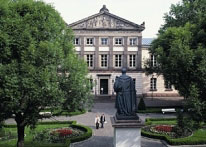 The Georg-August-University Goettingen (Germany) is establishing the Centre for
Modern Indian Studies (CeMIS) and invites applications for five new professorships to ensure the creation of an excellent and internationally visible centre for area studies.
The Georg-August-University Goettingen (Germany) is establishing the Centre for
Modern Indian Studies (CeMIS) and invites applications for five new professorships to ensure the creation of an excellent and internationally visible centre for area studies.
– A professorship in Society and Culture of Modern India (W3) with a regional focus on India and thematic expertise in social structure, ethnic religious diversity, and legal pluralism;
– A professorship in Indian Economic Development (W3), with a research focus on development economics issues in India and particular competence in inequality or poverty issues, political economy, or India-specific financial topics;
– A professorship in Indian Religions (W2), with particular competencies in modern Hinduism, Islam, and/or other religions prevalent in India;
– A professorship in Indian State and Democracy (W3) with a particular focus on Indian politics, Indian constitutional theory, Indian law, or comparative legal studies.
– The professorship in Modern Indian History (W3), has already been filled in July 2009 by Professor Ravi Ahuja.
Full information.
• Research Fellowships avaiable at Asia Research Institute in Singapore
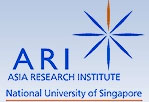 Applications are invited for (Senior) Research Fellowships, One-Year Visiting (Senior) Research Fellowships and Postdoctoral Fellowships at the Asia Research Institute (ARI) of the National University of Singapore (NUS) for commencement between April 2010 and September 2010.
The positions are intended for outstanding active researchers from around the world, to work on an important piece of research in the social sciences and humanities. Interdisciplinary interests are encouraged. Up to three months of a 12-month fellowship may be spent conducting fieldwork in the Asian region.
A majority of the positions will be allocated to some specific areas: • Asian Migration; • Changing Family in Asia; • Cultural Studies in Asia; • Religion and Globalisation in Asian Contexts; • Science, Technology, and Society; • Sustainable Cities; and an Open Category – open to talented people with
exciting ideas and worthwhile projects whose interests may not immediately fit one of the categories.
The Asia Research Institute (ARI) was established as a university-level institute in 2001 with a mission to provide a world-class focus and resource for research on the Asian region, located at one of its communication hubs.
ARI engages the humanities and social sciences broadly defined, and especially interdisciplinary frontiers between and beyond disciplines. Closing date for applications is 1 October 2009. More information.
Applications are invited for (Senior) Research Fellowships, One-Year Visiting (Senior) Research Fellowships and Postdoctoral Fellowships at the Asia Research Institute (ARI) of the National University of Singapore (NUS) for commencement between April 2010 and September 2010.
The positions are intended for outstanding active researchers from around the world, to work on an important piece of research in the social sciences and humanities. Interdisciplinary interests are encouraged. Up to three months of a 12-month fellowship may be spent conducting fieldwork in the Asian region.
A majority of the positions will be allocated to some specific areas: • Asian Migration; • Changing Family in Asia; • Cultural Studies in Asia; • Religion and Globalisation in Asian Contexts; • Science, Technology, and Society; • Sustainable Cities; and an Open Category – open to talented people with
exciting ideas and worthwhile projects whose interests may not immediately fit one of the categories.
The Asia Research Institute (ARI) was established as a university-level institute in 2001 with a mission to provide a world-class focus and resource for research on the Asian region, located at one of its communication hubs.
ARI engages the humanities and social sciences broadly defined, and especially interdisciplinary frontiers between and beyond disciplines. Closing date for applications is 1 October 2009. More information.
• SOAS in London introduces unique BA programme in Nepali
 In addition to its already existing BA programmes in Sanskrit, Hindi, Bengali, and South Asian Studies, the School of Oriental and African Studies (SOAS) in London now offers a BA programme in which
Nepali language, literature and culture can be studied in combination
with another social science or humanities subject. This programme is probably unique in the Euro-American world, and is organised by Michael Hutt,
Professor of Nepali and Himalayan Studies, and
Dean, Faculty of Languages and Cultures, at SOAS.
More information about SOAS’ BA programme in Nepali.
In addition to its already existing BA programmes in Sanskrit, Hindi, Bengali, and South Asian Studies, the School of Oriental and African Studies (SOAS) in London now offers a BA programme in which
Nepali language, literature and culture can be studied in combination
with another social science or humanities subject. This programme is probably unique in the Euro-American world, and is organised by Michael Hutt,
Professor of Nepali and Himalayan Studies, and
Dean, Faculty of Languages and Cultures, at SOAS.
More information about SOAS’ BA programme in Nepali.
See a brochure announcing the existence of the programme (as a pdf-file)
• Göteborg Center of Excellence for Sustainable Urban Futures to be launched 2010
 On 19 August 2009, Mistra – the Swedish Foundation for Strategic Environmental Research – decided to give funding to Gothenburg University and Chalmers University of Technology to establish an interdisciplinary and transdisciplinary world leading centre focusing on Sustainable Urban Development. The new centre, ”Mistra Urban Futures: The Göteborg Center of Excellence for Sustainable Urban Futures”. According to plans, it will be fully established by January 2010. The Mistra Centre for Urban Futures should act as a cluster for development of knowledge and innovation for urban sustainability, form a resource base for case studies and scientific analysis, ensure a strong chain from international disciplinary excellence to local knowledge, and serve as ‘showcases’ for other cities and countries. Read the winning proposal, and Mistra’s evaluations on the other two proposals (Stockholm, and Lund/Malmö) made for the new centre.
On 19 August 2009, Mistra – the Swedish Foundation for Strategic Environmental Research – decided to give funding to Gothenburg University and Chalmers University of Technology to establish an interdisciplinary and transdisciplinary world leading centre focusing on Sustainable Urban Development. The new centre, ”Mistra Urban Futures: The Göteborg Center of Excellence for Sustainable Urban Futures”. According to plans, it will be fully established by January 2010. The Mistra Centre for Urban Futures should act as a cluster for development of knowledge and innovation for urban sustainability, form a resource base for case studies and scientific analysis, ensure a strong chain from international disciplinary excellence to local knowledge, and serve as ‘showcases’ for other cities and countries. Read the winning proposal, and Mistra’s evaluations on the other two proposals (Stockholm, and Lund/Malmö) made for the new centre.
• Danish Network for Pakistani Studies to be formed
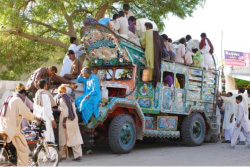 An initiative has been taken to form a Danish Network for Pakistani Studies (DNPS). Researchers within the fields of history, culture, language studies, journalism, conflict studies, development studies, islamology, etc. are invited to participate in a meeting at Copenhagen University on Thursday 1 October 2009. The meeting has been convened by Iram Nisa Asif, PhD Fellow at the Dept. of History of Religions,
Institute for Cross-Cultural and Regional Studies, University of Copenhagen. More information about the proposal (only in Danish).
An initiative has been taken to form a Danish Network for Pakistani Studies (DNPS). Researchers within the fields of history, culture, language studies, journalism, conflict studies, development studies, islamology, etc. are invited to participate in a meeting at Copenhagen University on Thursday 1 October 2009. The meeting has been convened by Iram Nisa Asif, PhD Fellow at the Dept. of History of Religions,
Institute for Cross-Cultural and Regional Studies, University of Copenhagen. More information about the proposal (only in Danish).
• More information about South Asia related
research at Swedish and Nordic universities
See SASNET’s page, http://www.sasnet.lu.se/research.html
• Course on History of Indian Philosophy at Södertörns Högskola
The School of Culture and Communication, Södertörns högskola, introduces a new 15 ECTS course in History of Indian Philosophy starting from the Fall semester 2009. The contact person is Dr. Anna-Pya Sjödin. It is the first course of its kind in Sweden. It focuses on the Buddhist, Hindu, Materialist, and Sceptical traditions that have existed in India for a long time, starting with Vedic metaphysical speculations 3,500 years ago, and ends up with today’s postcolonial theories. The course is aimed at students within the humanities, mainly Philosophy, Science of Religion, and from History of Ideas. More information.
• Information about South Asia related
education at Swedish and Nordic universities
See SASNET’s page, http://www.sasnet.lu.se/education.html
• Ann Arbor conference in honor of Barbara Metcalf
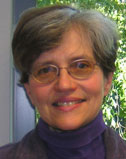 A conference on ”Muslim Voices: Traditions and Contexts – A Conference in Honor of Barbara
Metcalf” will be held at the Center for South Asian Studies, University of Michigan in Ann Arbor, USA, 11–13 September 2009. There are few scholars who have influenced the field of South Asian Muslim
history more substantially in the last 25 years than has Barbara D.
Metcalf. This is a result both of the orientation and depth of her
scholarship and of her active role in institution-building in the field.
This conference is organised in honoring professor Metcalf on the occasion of her retirement
by bringing together leading scholars from around
the world to engage with key themes in Metcalf's scholarly oeuvre. The Keynote speech will be given by Francis Robinson,
University of London, who will talk about ”Strategies of authority in Muslim South Asia in the 19th and 20th
Centuries”. More information.
A conference on ”Muslim Voices: Traditions and Contexts – A Conference in Honor of Barbara
Metcalf” will be held at the Center for South Asian Studies, University of Michigan in Ann Arbor, USA, 11–13 September 2009. There are few scholars who have influenced the field of South Asian Muslim
history more substantially in the last 25 years than has Barbara D.
Metcalf. This is a result both of the orientation and depth of her
scholarship and of her active role in institution-building in the field.
This conference is organised in honoring professor Metcalf on the occasion of her retirement
by bringing together leading scholars from around
the world to engage with key themes in Metcalf's scholarly oeuvre. The Keynote speech will be given by Francis Robinson,
University of London, who will talk about ”Strategies of authority in Muslim South Asia in the 19th and 20th
Centuries”. More information.
• Time for the 38th Annual Madison Conference
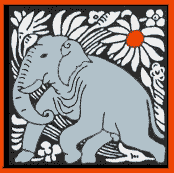 The 38th Annual Madison Conference on South Asia will be held on October 22–25, 2009. The conference, The Conference that is sponsored by the Center for South Asia at the University of Wisconsin-Madison, attracts over 500 scholars and specialists on South Asia and is a great venue for intellectual, professional, and social exchange. Panels, roundtables, and individual papers on all topics pertaining to South Asian studies are welcome. Registration and proposal submission forms (single papers, panels, roundtables, preconferences) are available on line. Registration as a non-presenting participant at the Conference is open to the general public. The conference features 75 or more academic panels and roundtables, as well as association meetings and special events ranging from performances to film screenings. Deadline for registration is 1 October 2009. Venue: Madison Concourse Hotel, 1 West Dayton St., Madison, Wisconsin, USA. More information.
The 38th Annual Madison Conference on South Asia will be held on October 22–25, 2009. The conference, The Conference that is sponsored by the Center for South Asia at the University of Wisconsin-Madison, attracts over 500 scholars and specialists on South Asia and is a great venue for intellectual, professional, and social exchange. Panels, roundtables, and individual papers on all topics pertaining to South Asian studies are welcome. Registration and proposal submission forms (single papers, panels, roundtables, preconferences) are available on line. Registration as a non-presenting participant at the Conference is open to the general public. The conference features 75 or more academic panels and roundtables, as well as association meetings and special events ranging from performances to film screenings. Deadline for registration is 1 October 2009. Venue: Madison Concourse Hotel, 1 West Dayton St., Madison, Wisconsin, USA. More information.
• Fourth International Conference on
Fermented Foods in Anand
The Fourth International Conference on
Fermented Foods, Health Status
and Social Well-being will be held at Anand Agricultural University in Gujarat, India, on 11–12 December 2009. The conference is organised by the
Swedish South Asian Network on Fermented Foods (SASNET Fermented Foods), i association with Anand
Agricultural
University,
the National Dairy
Development Board in
Anand, and Lund University,
Sweden. SASNET Fermented Foods was established with SASNET support in 2002 (more information). Last date for submissions of abstracts is 11 November 2009. Full information about the 2009 conference.
• National Consultation on HIV Social Research Priorities at TISS
A National Consultation on HIV Social Research Priorities in India will be held in Mumbai 17–19 December 2009. The consultation is organised by the Tata Institute of Social Sciences (TISS) in Mumbai, and is designed to identify and prioritize HIV social research needs and to contribute to theory driven, empirically validated research that affects people vulnerable to and made vulnerable by HIV infection. Guest speakers will include experts and researchers from a broad spectrum of HIV/AIDS agencies, academic institutions and health and development organizations. Experts will also be drawn from fields such as Human Rights, gender, Heath Equity and various other social science areas. They will discuss issues that interface with HIV/AIDS theory and methods which are relevant to the HIV response in India. A selected list of peer reviewed papers will be nominated for publication in an edited volume, the HIV Social Research Agenda in India. Full information.
The Centre for Studies in Social Sciences (CSSSC) in collaboration with Ford Foundation and the South-South Exchange Programme for the History of Development (SEPHIS, Netherlands) will hold its 15th Annual Cultural Studies Workshop from January 30 – February 4, 2010 at Santiniketan, West Bengal, India. The broad theme for this year’s workshop is The Sacred in Contemporary Culture. The workshop is intended to give young researchers an opportunity to share their work with senior scholars in the field, including some of the faculty of the CSSSC. It is aimed at doctoral or post doctoral students (below the age of 35) whose ongoing or just completed work focuses on one or more of the themes listed above. Priority will be given to students currently affiliated to Indian educational institutions, but international participants who have studied, or have been working long term, in countries of the global South are also invited to apply. More information.
• International Bengal Studies Congress 2010 to be held in Delhi
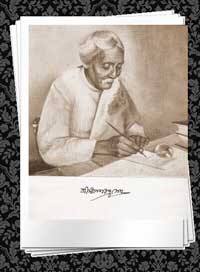 The International Congress of Bengal Studies 2010 will be held at the
University of Delhi, on 25–28 February 2010. Papers are now invited.
The theme of the 2010 Congress is Bengali Literary Studies. History of
Bengali Literary Studies, Sociology of the development of the Discipline,
Philosophical Orientation and Ideological Contestations in the development
of the Discipline, Cultural Politics of Syllabi and Research Agenda, are
some of the sub-themes on which papers may be proposed. Papers on other
areas of Bengal Studies, including, but not limited to, Literature and
Criticism, Comparative Literature, Linguistics, Folk Literature and
Popular Literature, Cultural Studies, Media Studies, History, Economics,
Sociology, Fine Arts, and, Philosophy, are also invited. The conference convener is Dr. Amitava Chakraborty, Dept. of Modern Indian Languages & Literary Studies,
University of Delhi. Papers should be
either in Bengali or in English. Last date for submission of paper proposal/abstract is
15 November 2009. More information.
The International Congress of Bengal Studies 2010 will be held at the
University of Delhi, on 25–28 February 2010. Papers are now invited.
The theme of the 2010 Congress is Bengali Literary Studies. History of
Bengali Literary Studies, Sociology of the development of the Discipline,
Philosophical Orientation and Ideological Contestations in the development
of the Discipline, Cultural Politics of Syllabi and Research Agenda, are
some of the sub-themes on which papers may be proposed. Papers on other
areas of Bengal Studies, including, but not limited to, Literature and
Criticism, Comparative Literature, Linguistics, Folk Literature and
Popular Literature, Cultural Studies, Media Studies, History, Economics,
Sociology, Fine Arts, and, Philosophy, are also invited. The conference convener is Dr. Amitava Chakraborty, Dept. of Modern Indian Languages & Literary Studies,
University of Delhi. Papers should be
either in Bengali or in English. Last date for submission of paper proposal/abstract is
15 November 2009. More information.
• Other conferences connected to South Asian
studies arranged all over the World
See SASNET’s page, http://www.sasnet.lu.se/conferences.html#conf
Important lectures and seminars in Scandinavia
• CPAS Lecture on Current State of Pakistan/Afghanistan War
Noor Muhammed Khan, Guest Researcher at the Stockholm International Peace Research Institute (SIPRI) holds an open lecture on ”The Current State of Pakistan/Afghanistan War, New Directions
and Pitfalls” at Stockholm University on Wednesday 16 September 2009, 15.00–17.00. Mr. Khan has an MA in Governance and Development from the Institute of Development Studies, University of Sussex, UK. In recent years he has worked with development projects in Pakistan for for the United Nations Development Program (UNDP), and the British Department for International Development (DFID). The seminar is one of the regular Wednesday lectures arranged by the Centre for Pacific Asian Studies (CPAS), at Stockholm University. Venue for the lecture: Room 136, Dept. for Oriental Languages, Kräftriket 4 A (earlier Roslagsvägen 101), Stockholm.
• Meera Nanda keynote speaker at second ADI conference in Copenhagen
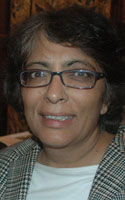 The Asian Dynamics Initiative at the University of Copenhagen will organize a conference, open to the public, on the topic ‘The Soft Power Impact of Asia’ on Thursday 17 September 2009, 13.30–17.30. The purpose of the event is to celebrate the one-year anniversary of the Asian Dynamics Initiative (ADI). ADI is a cross-faculty and interdisciplinary effort to meet the current challenges and demands for better knowledge of and deeper insights into Asian matters. The Steering Committee of ADI has decided to mark the day with an academic event with international speakers and a broad appeal. Soft power and soft power impact are topics that attract growing interest, also in academic circles. The ADI Conference will bring together four international experts, who in various ways will address the overall topic ‘Soft Power Impact of Asia'. In their keynote speeches they will touch upon a wide range of subjects from popular culture – manga and anime to Hinduism, diplomacy and global financial crisis. South Asia will be represented by Dr. Meera Nanda (photo) from Jawaharlal Nehru University (JNU) in New Delhi, India who will speak about
'Hindu triumphalism and India's emergence as a global power'. Venue: University of Copenhagen, The Ceremonial Hall, Frue Plads, Copenhagen. More information.
The Asian Dynamics Initiative at the University of Copenhagen will organize a conference, open to the public, on the topic ‘The Soft Power Impact of Asia’ on Thursday 17 September 2009, 13.30–17.30. The purpose of the event is to celebrate the one-year anniversary of the Asian Dynamics Initiative (ADI). ADI is a cross-faculty and interdisciplinary effort to meet the current challenges and demands for better knowledge of and deeper insights into Asian matters. The Steering Committee of ADI has decided to mark the day with an academic event with international speakers and a broad appeal. Soft power and soft power impact are topics that attract growing interest, also in academic circles. The ADI Conference will bring together four international experts, who in various ways will address the overall topic ‘Soft Power Impact of Asia'. In their keynote speeches they will touch upon a wide range of subjects from popular culture – manga and anime to Hinduism, diplomacy and global financial crisis. South Asia will be represented by Dr. Meera Nanda (photo) from Jawaharlal Nehru University (JNU) in New Delhi, India who will speak about
'Hindu triumphalism and India's emergence as a global power'. Venue: University of Copenhagen, The Ceremonial Hall, Frue Plads, Copenhagen. More information.
• DIIS seminar on The Pakistani Taliban
The Danish Institute for International Studies, DIIS, organises a seminar on The Pakistani Taliban, on Friday 18 September 2009, 13.00–15.30. With the reported death of the Pakistani Taliban leader Beitullah Mehsud we are seeing a number of conflicts coming to the surface. Arguably these fault lines have long been there – and are proof of the variation and complexities of the umbrella group. Laila Bokhari will discuss some of the questions that have united and some that have caused splits within the group – and importantly what consequences a leadership struggle may have for the Pakistani Taliban. Mona Kanwal Sheikh will discuss why it is crucial to broaden these debates by disaggregating the Pakistani Taliban and how the good, bad, and ugly Taliban distinction would make sense as a viable policy option. Venue; DIIS, Main Audit. Strandgade 71, gr. floor, 1401 Copenhagen K. More information.
• Gothenburg seminar on Indian Philosophy and Religion
The Department of Literature, History of Ideas, and Religion, Gothenburg University, arranges an open seminar entitled ”An Introduction to Indian Philosophy and Religion” on Thursday 24 September 2009, 09.15–12.00. The seminar is organised in collaboration with the International Forum for the Study of Society and Religion (IFSSR), a joint initiative by the Faculty of Arts at the University of Gothenburg; Jadavpur University, Kolkata; Oxford Center for Hindu Studies, UK; and University of Århus, Denmark. More information about this newly formed network that had its first conference in Kolkata in June 2009.
The Gothenburg seminar features two visiting lecturers from Jadavpur University, Prof. Piyali Palit, Dept. of Philosophy; and Prof. Ruby Sain, Dept. of Sociology. Venue for the seminar: Room L 100, Humanisten, Lennart Torstenssonsgatan 8, Gotheburg. More information.
• Oslo seminar on current themes in Indian society
A one-day seminar on ”India today” will be held at the University of Oslo on Tuesday 29 September 2009. The seminar is jointly organised by the Centre for Development and the Environment (SUM); the Department of Culture Studies and Oriental Languages (IKOS); and the Norwegian Asia Network (Asianettverket). The seminar will focus on current themes in Indian society, and it is a follow-up to a seminar entitled ”Emerging India: Challenges and Prospects” (more information) that was organised by the University of Oslo in March 2007. Some of the participants from that seminar have been asked to come back and give updated perspectives based on their research, but they will be joined by a number of other new researchers from Norway, Denmark and Sweden. The seminar is convened by Kenneth Nielsen, a social anthropologist currently working on a PhD project entitled ”In Defence of the Land: Rural Social Movements and Urban Activists in India’s West Bengal”. More information (in Norwegian only).
Business and Politics
• Information about South Asia related business and politics in Sweden
See SASNET's page, http://www.sasnet.lu.se/polbuss.html
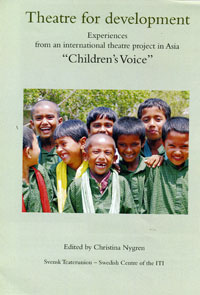 South Asia related culture in
Scandinavia
South Asia related culture in
Scandinavia
• Voices of the Children theatre project results in new book
The Voices of the Children is the name of a Swedish project aimed at strengthening children’s theatre in Asia. The project, funded by Sida,
was launched in 2004, and has been coordinated by Dr. Christina Nygren, Dept. of Musicology and Theatre Studies,
Stockholm University. Now the project, that has included an exchange of Swedish and Indian/Bangladeshi
theatre groups, has been completed. It has resulted in the publication of a book, entitled ”Theatre for Development. Experiences from an international theatre project in Asia”. On Wednesday 16 September 2009, 16–19, a book release party is held in Stockholm, at Teater Påfågeln, St Eriksgatan 84.
Christina Nygren will be there along with Ms. Ann Mari Engel, General Secretary for the Swedish Theatre Union, that also has been involved in the project. Mr.
Rudraprasad Sengupta from the theatre group Nandan in Kolkata, India, will also participate in the function, speaking about Nandan’s long work to engage children and youth from vulnerable groups in theatre activities.
Those who wish to take part in the book release party, should inform the project assistant Emma Jansson before 10 September.
• Atiq Rahimi participates in 25th Gothenburg Book Fair
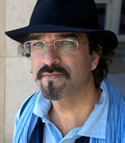 The 25th annual Göteborg International Book and Library Fair will be held 24–27 September 2009. The 2009 seminar programme includes 442 seminars, and an impressive 785 participants from 25 countries will join in the seminars, talks and discussions. There is however only a limited number of South Asia related events this year. The Afghani writer Atiq Rahimi (photo) will participate. During the war in Afghanistan, Rahimi lived as a refugee in France, but has now returned to Kabul to work as a creative advisor to the country’s leading media company. His first book Earth and Ashes was published in 2000, and was later turned into a movie. Now his recent book, that won the French Prix Goncourt 2008, has been translated into Swedish and published by Leopard publishing house with the title Tålamodets sten. More information.
The 25th annual Göteborg International Book and Library Fair will be held 24–27 September 2009. The 2009 seminar programme includes 442 seminars, and an impressive 785 participants from 25 countries will join in the seminars, talks and discussions. There is however only a limited number of South Asia related events this year. The Afghani writer Atiq Rahimi (photo) will participate. During the war in Afghanistan, Rahimi lived as a refugee in France, but has now returned to Kabul to work as a creative advisor to the country’s leading media company. His first book Earth and Ashes was published in 2000, and was later turned into a movie. Now his recent book, that won the French Prix Goncourt 2008, has been translated into Swedish and published by Leopard publishing house with the title Tålamodets sten. More information.
• Indian Library presents volume with Indian poetry translated into Swedish
 The Indo-Swedish Translation Project/Indian Library will also be represented at the 2009 Book Fair, to present its latest volume of Indian literature translated into Swedish. This time an anthology with current Indian poetry. It has been edited by Tomas Löfström and Birgitta Wallin, and published by Tranan publishing house. A seminar, entitled ”Indiska versfötters väg till Sverige”, will be jointly organised on Friday 25 September by Indian Library, Tranan and Karavan. The Indian poet Anjum Hasan, and the Swedish poet Marie Lundquist, will discuss the poems in the book, and also the workshop that preceded the publication of the book. This workshop was held in January 2009 in Calangute, Goa, India, and involved poets from both India and Sweden, including K. Satchidanandan, former Secretary of Sahitya Akademi. During workshop sessions, they translated Indian poetry from different languages into Swedish. More information.
The Indo-Swedish Translation Project/Indian Library will also be represented at the 2009 Book Fair, to present its latest volume of Indian literature translated into Swedish. This time an anthology with current Indian poetry. It has been edited by Tomas Löfström and Birgitta Wallin, and published by Tranan publishing house. A seminar, entitled ”Indiska versfötters väg till Sverige”, will be jointly organised on Friday 25 September by Indian Library, Tranan and Karavan. The Indian poet Anjum Hasan, and the Swedish poet Marie Lundquist, will discuss the poems in the book, and also the workshop that preceded the publication of the book. This workshop was held in January 2009 in Calangute, Goa, India, and involved poets from both India and Sweden, including K. Satchidanandan, former Secretary of Sahitya Akademi. During workshop sessions, they translated Indian poetry from different languages into Swedish. More information.
• Bollywood exhibition in Gothenburg closes down on 27 September
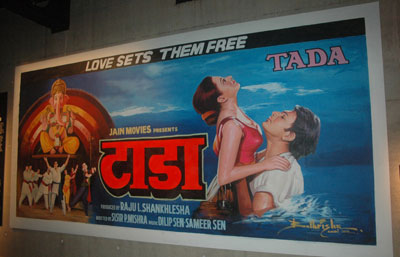 The exhibition "BOLLYWOOD”, is now shown at the Museum of World Cultures in Gothenburg. The exhibition, previously shown at the Museum of Far Eastern Antiquities (Östasiatiska
Museet) in Stockholm, takes off in Indian films and shows how contemporary India is connected
to its past through stories and myths about love, gods and heroes. What is Bollywood? Why has it become so fantastically popular? Who are the world's most popular movie stars, really? The exhibition is entrance free and continues until 27 September 2009. During this period many programmes with film shows, dance performances and lectures are organised.
In the exhibition, produced by the Museum of World Culture in cooperation with the Museum of Far Eastern Antiquities and the Helsinki City Art Museum in Finland, the entire family may enjoy experiences from a world that still seems to be far from our daily lives. Or is that really so? In the Bollywood exhibition, the audience can try to be a singing star, record their own Bollywood film and dance in great dance scenes from popular Bollywood movies. The exhibition discusses what Bollywood as a cultural expression actually consists of and how such a massive success can affect your world view. Venue: Världskulturmuseet, Södra Vägen 54, Göteborg. More
information.
The exhibition "BOLLYWOOD”, is now shown at the Museum of World Cultures in Gothenburg. The exhibition, previously shown at the Museum of Far Eastern Antiquities (Östasiatiska
Museet) in Stockholm, takes off in Indian films and shows how contemporary India is connected
to its past through stories and myths about love, gods and heroes. What is Bollywood? Why has it become so fantastically popular? Who are the world's most popular movie stars, really? The exhibition is entrance free and continues until 27 September 2009. During this period many programmes with film shows, dance performances and lectures are organised.
In the exhibition, produced by the Museum of World Culture in cooperation with the Museum of Far Eastern Antiquities and the Helsinki City Art Museum in Finland, the entire family may enjoy experiences from a world that still seems to be far from our daily lives. Or is that really so? In the Bollywood exhibition, the audience can try to be a singing star, record their own Bollywood film and dance in great dance scenes from popular Bollywood movies. The exhibition discusses what Bollywood as a cultural expression actually consists of and how such a massive success can affect your world view. Venue: Världskulturmuseet, Södra Vägen 54, Göteborg. More
information.
• Tibetan Cham dancers were refused Swedish visa to perform in Malmö
A performance of Tibetan Cham dance by artists from the Gyudmed Monastery in South India was supposed to take place in Malmö on Tuesday 8 September 2009, 18–21, a concert organised by BioCentrum, the Bollywood cinema hall, at Järnvägsgatan 28 in Limhamn. But the Swedish government refused to issue visas to the Tibetan group from India. Instead, their spriitual leader, lama Ven. Geshe Thupten Khedroup, residing in Paris, will come to Malmö and lecture on the situation for the Tibetans in China. More information.
• 9th edition of Florence Indian Film Festival
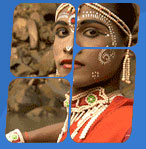 The 9th edition of River to River. Florence Indian Film Festival will be held 4–10
December 2009 in
Florence, Italy. The River to River festival, under the Patronage of the Embassy of India in Rome, is the first festival in the world entirely devoted to films from and about India. It is supported by Mediateca Regionale Toscana-Film Commission as part of the Cinquanta Giorni di Cinema Internazionale a Firenze and will be held at Odeon, the beautiful 20s-style theatre located in the heart of Florence. The deadline for entries is September 30th, 2009. The film chosen by the Festival audience will win the
River to River DigiChannel Audience Award.
The prize (one for each category within the feature films, the shorts, and the documentaries) consists in the free promotion of the film on DigiChannel, including web publication, newsletter, homepage screening and being part of the DC worldwide network. More information.
The 9th edition of River to River. Florence Indian Film Festival will be held 4–10
December 2009 in
Florence, Italy. The River to River festival, under the Patronage of the Embassy of India in Rome, is the first festival in the world entirely devoted to films from and about India. It is supported by Mediateca Regionale Toscana-Film Commission as part of the Cinquanta Giorni di Cinema Internazionale a Firenze and will be held at Odeon, the beautiful 20s-style theatre located in the heart of Florence. The deadline for entries is September 30th, 2009. The film chosen by the Festival audience will win the
River to River DigiChannel Audience Award.
The prize (one for each category within the feature films, the shorts, and the documentaries) consists in the free promotion of the film on DigiChannel, including web publication, newsletter, homepage screening and being part of the DC worldwide network. More information.
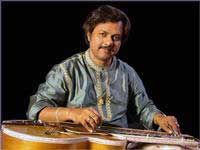 • Swedish Wind Ensemble plays with Debashish Bhattacharya
• Swedish Wind Ensemble plays with Debashish Bhattacharya
The Swedish Wind Ensemble (Stockholms Läns Blåsarsymfoniker), conducted by the trombonist Christian Lindberg, plans for a Bollywood music fusion concert in March 2010. The world’s leading slide guitarist Debashish Bhattacharya from Kolkata, India, an artist who has performed several times before in Sweden, will play together with the orchestra and thereby create a mixture of Swedish and Indian music, on Sunday 21 March, at 15.00. Venue: Nybrokajen 11, Stockholm. More information.
• More information about South Asia related culture
in Sweden and Scandinavia
See SASNET’s page, http://www.sasnet.lu.se/culture.html
New and updated items on SASNET web site
• Swedish departments where research on
South Asia is going on:
Constantly added to the list of research environments at Swedish
universities, presented by SASNET. The full list now includes 254 departments,
with detailed descriptions of the South Asia related research and education
taking place! Go to http://www.sasnet.lu.se/environment.html
ƒ Philosophy, School of Culture and Communication, Södertörn University College, Huddinge
ƒ Division of Clinical Nutrition and Metabolism, Department of Public Health and Caring Sciences, Uppsala University
• Useful travelling information
Look at http://www.sasnet.lu.se/travelling.html.
Updated travel advises from the The British Foreign & Commonwealth
Office about safety aspects on travelling to the countries of
South Asia.
Best regards,
Lars Eklund
deputy director/webmaster
SASNET/Swedish South Asian Studies Network
SASNET is a national network for research, education, and information about South Asia based at Lund University. Its aim is to promote a dynamic networking process in which Swedish researchers co-operate with researchers in South Asia and globally.
The SASNET network is open to all the sciences. Priority is given to interdisciplinary cooperation across faculties, and more particularly to institutions in the Nordic countries and South Asia. SASNET believes that South Asian studies will be most fruitfully pursued as a cooperative endeavour between researchers in different institutions who have a solid base in their mother disciplines.
The network is financed by Sida (Swedish
International Development Cooperation Agency) and by Lund
University.
Postal address: SASNET – Swedish South Asian Studies Network,
Scheelevägen 15 D, SE-223 70 Lund, Sweden
Visiting address: Ideon Research Park, House Alpha 1 (first floor,
room no. 2040), in the premises of the Centre for East and South
East Asian Studies at Lund University (ACE).
Phone: + 46 46 222 73 40
Fax: + 46 46 222 30 41
E-mail: sasnet@sasnet.lu.se
Web site:
http://www.sasnet.lu.se
SASNET - Swedish South Asian Studies Network/Lund
University
Address: Scheelevägen 15 D, SE-223 70 Lund, Sweden
Phone: +46 46 222 73 40
Webmaster: Lars Eklund
Last updated
2010-05-20
